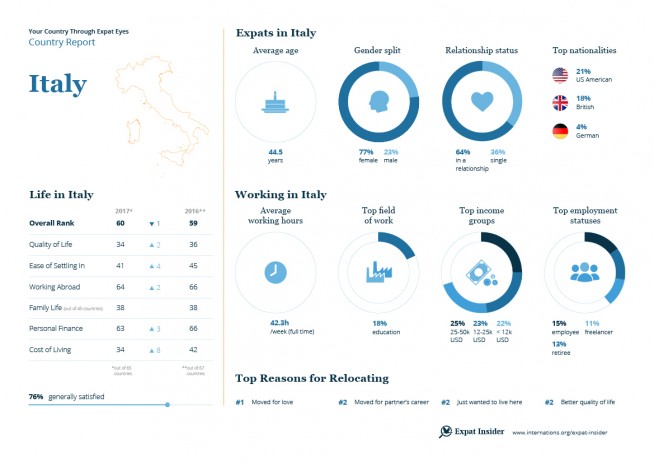Settling Down in La Dolce Vita, Italy
- 60% are extremely happy with travel opportunities
- Parents positive about children’s safety
- Continued concerns about economic stability
- Income lower than back home for 47% of expats
- Italian language skills make settling down easier
Moving for L’Amore and Travel Opportunities
While Italy’s rich culture attracts many expats — one in ten says they moved simply because they wanted to live in Italy — one in six respondents (17%) states that their main reason for relocating was to join their partner in their home country. In fact, close to three in five expats who are in a relationship (57%) have an Italian partner.
Despite all the risks typically connected with moving abroad for love, expats in Italy seem generally content with their life. The country ranks 34th out of 65 countries in the Quality of Life Index, performing well when it comes to the chance to travel: close to nine in ten expats (89%) are happy with the travel opportunities, and 60% even rate this aspect as very good (global average: 46%). However, this result is tempered by the country’s rather average rating for transportation infrastructure, which is regarded negatively by nearly a third of respondents in Italy (32%).
Italy performs mediocrely in the Health & Well-Being subcategory as well, ranking 31st out of 65 countries. One weak area is politics; while few expats (17%) saw it as a potential disadvantage prior to their move, 46% rate Italy’s political stability negatively. However, the majority of expats (62%) feel positively about the affordability of healthcare. Respondents in Italy also are happy with safety, with four in five (80%) rating their personal safety positively, and 78% of expat parents rating their children’s safety as generally good.
Complex Taxes and Poor Career Prospects
Almost one-third of expats living in Italy (32%) considered taxation to be a potential disadvantage prior to their move. This may be connected to the fact that Italy has one of the most complex taxation systems in the world. Bureaucracy in general is high on the list of things respondents don’t like about living in Italy. According to one British expat, “it seems to be far more complicated than it needs to be and is difficult to navigate, especially with limited language skills”.
Over three-fifths of expats (61%) are also unhappy with the state of the economy; the country is struggling to reduce its debt and economic growth is slow. Overall, Italy performs poorly in the Working Abroad Index, ranking 64th out of 65 countries in both the index itself and its Job & Career subcategory. Expats are pessimistic about their career prospects, with over half of respondents (51%) feeling negatively about this factor. The same can be said for job security: almost two in five expats (38%) rate it negatively, compared to a worldwide average of 22%.
The bureaucracy is difficult to navigate, especially with limited language skills.
The country’s weak economic position is also clear from the Personal Finance Index, in which Italy ranks 63rd. One-third of expats view their financial situation unfavorably — an opinion that is shared by less than one-fifth of expats around the world (19%). This dissatisfaction may be connected to low incomes, with nearly half of working respondents (47%) saying it’s lower than it would be back home.
Limited Education Options, Great Family Life
Almost half of expat parents in Italy are unhappy with the availability of childcare options (49%) and education options (48%). Despite this dissatisfaction, over half of expat parents (51%) believe that education is easy to afford. Expat parents are, however, less happy with the affordability of childcare, with only 35% rating this factor favorably.
It’s not all doom and gloom when it comes to family life in Italy; nearly four-fifths of expat parents (78%) are satisfied with their children’s health. Expats with kids are also happy with the country’s attitude towards families, which only 2% of parents rate negatively. This satisfaction led to one British expat sharing their happiness at “seeing my children expand their minds to another culture and language”. Although some parents aren’t too positive about the available leisure activities for their children (24% are dissatisfied vs 17% globally), over three-quarters (76%) are happy with family life in general.
Parla Italiano?
Over four in ten respondents (44%) believe it’s easy to learn Italian, and seven in ten say they speak it at least fairly well. This is fortunate, seeing as sufficient knowledge of Italian seems to be necessary to live a comfortable expat life in the Mediterranean country: 71% say it’s hard to live there without speaking the local language. Being able to speak Italian well might also have convinced expats to stay longer: 37% of respondents say that Italy has been their home for more than ten years, compared to 23% globally. Over three in ten respondents (31%) also have mostly local residents as friends (global average: 19%).
I think the best thing about Italy is the people. They are really friendly and will go out of their way to help you out.
In general, 42% generally agree it’s easy to settle down and nearly two-thirds (66%) found it easy to get used to the local culture. This may be helped by the fact that 75% consider the local population to be friendly. A US American wrote, “I think the best thing about Italy is the people. They are really friendly and will really go out of their way to help you out”. All in all, Italy ranks 41st out of 65 countries in the Ease of Settling In Index, a slight improvement on its 45th place out of 67 in 2016.
Besides a friendly population, almost seven in ten expats living in Italy (69%) considered the climate and weather to be a potential benefit prior to their move. After experiencing the Italian weather, this statistic went up by ten percentage points.




